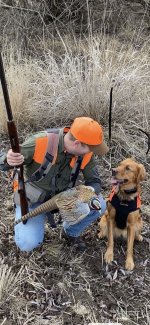A5 Sweet 16
Well-known member
I've hunted w/ a lot of breeds that've been fabulous finders/retrievers of downed birds (crippled or not). I firmly believe almost any well-bred hunting breed, who hunts wild pheasants a lot & who's been trained effectively will be essentially the same in this department. But WITHOUT good breeding, experience &/or training, are some traits of one breed going to shine brighter than that of another? Probably. The average lab is probably more likely to naturally retrieve. Many breeds hunt "dead" in my mind equally well. I've never seen a breed mark & attack a downed pheasant quicker than a springer. Of course, your average flusher isn't very likely to point a holed-up cripple.  I just think all good pheasant dogs are phenomenal. And with breeding, experience & training....breed doesn't matter. My springers fit my family/home & hunting style perfectly.
I just think all good pheasant dogs are phenomenal. And with breeding, experience & training....breed doesn't matter. My springers fit my family/home & hunting style perfectly.

